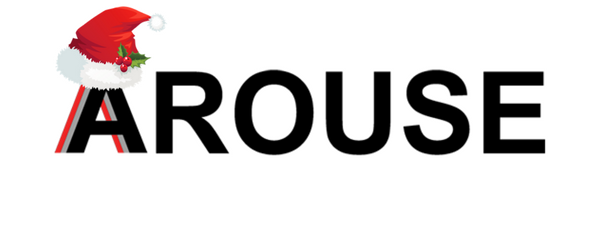Zootopia: A Kid-Friendly Racial Commentary
"...If one thoroughly examines the themes of Zootopia, one will find that it’s a little more than just a children’s movie."
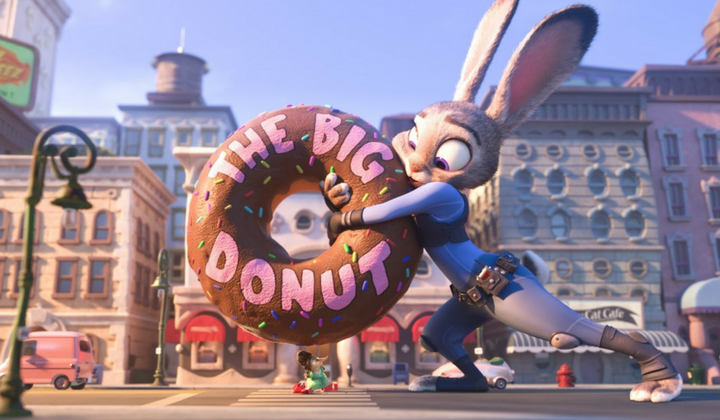
Published
At the surface, one may see Disney’s film Zootopia, released in March 2016, as a lighthearted children’s film about a bunny cop. Everything about the film, from its energetic characters to its colorful scenery is perfectly designed to appeal to kids of all ages. The movie follows Judy Hopps, who is the first rabbit cop in history and who is assigned to patrol the metropolis of Zootopia where ‘prey’ and ‘predators’ live together in harmony. Along the way, she teams up with a con artist fox named Nick Wilde to solve a case involving the disappearances of fourteen predators in the city. To the unsuspecting viewer, nothing should seem too peculiar about this whimsical story. However, if one thoroughly examines the themes of Zootopia, one will find that it’s a little more than just a children’s movie.
Upon its release, Zootopia garnered a huge amount of praise upon its release for its subtle yet effective commentary on race. ‘White’, or caucasian people are the dominant race in the United States. According to the 2010 U.S. census, approximately 72.4% of the population identified as being white. This leaves a little over one quarter of the population to account for all other races. In Zootopia, race is represented through the terms ‘prey’ and ‘predator’. Predators are the minority - in the film, Assistant Mayor Bellwether makes the claim that Zootopia’s population is 90 percent prey and 10 percent predators, supporting this theory. In the film, prey are characterized as small and defenseless animals. For example, Judy is a rabbit, and for this reason she is mocked when she announces that it is her dream to become a police officer. No rabbits have ever become police officers because, as prey, they simply do not fit the bill of what it takes to become an officer. When Judy makes it to Zootopia to begin her career, all of the other officers are large predators. Predators are typically characterized as larger animals who are strong and fearsome. In Zootopia, some predators, such as foxes and otters, do not fit this bill yet still fall under the category of predator.
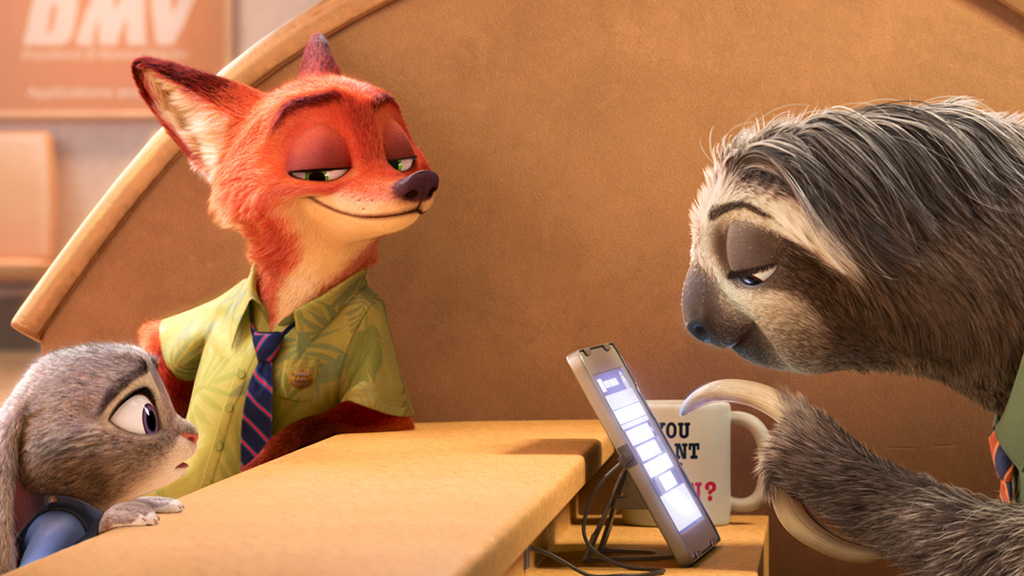
A divide between prey and predator is seen consistently throughout the film. In one of the opening scenes, Judy is seen being bullied by a fox named Gideon Grey. This scene sets the tone for the entire movie; Gideon pushes Judy to the ground and tells her, “I want you to remember this moment the next time you think you will ever be anything more than just a stupid, carrot-farming, dumb bunny”. He suggests that there is no room for mobility, and that one’s status as predator or prey determines the path your life will follow; hence why Judy is met with ridicule when trying to join the police force. Just as one cannot stop being predator or prey, one cannot change their race. There is also the ideology that race can limit one’s opportunities in life. For example, African-Americans are more likely to live in low-income areas and, as a result, receive lower-quality educations, giving them a disadvantage later in life when it comes to finding a career.
Racial profiling is defined by the ACLU as “the discriminatory practice by law enforcement officials of targeting individuals for suspicion of crime based on the individual's race, ethnicity, religion or national origin”. In the United States, there is a long standing history of racial profiling against blacks and Hispanics. From 2004 to 2012, over half of the stop and frisks carried out by New York City police officers involved someone who was black. Racial profiling has become a serious issue. Stops are to be conducted by police officers only if there is reasonable suspicion that someone has or is going to commit a crime. Of the 2.3 million stops that have been conducted against black people in New York City in the aforementioned timeframe, a mere 16,000 of them resulted in seizures. Compare these numbers to the amount of stops of white people in the same period of time - 435,000 stops with the same amount of seizures. These statistics strongly suggest that there is a high incidence of racial profiling among police officers.
Racial profiling is hinted at very early on in Zootopia. On Judy’s first day working as a cop, she spots Nick at Jumbeaux’s Café, an elephant-owned ice cream shop. She seems suspicious of his behavior and walks inside the shop to investigate. Upon further inspection she finds that Nick is being denied service, even though he is doing nothing wrong. The only factor that could have played into Nick being denied service was that he was a predator in a store owned by prey. It is only after Judy threatens to charge the shop owners with various health code violations that Nick is allowed to purchase anything at the store. Not only were the shop owners acting in a prejudiced way by denying Nick service, but Judy was as well for acting under the presumption that Nick was the one causing problems.
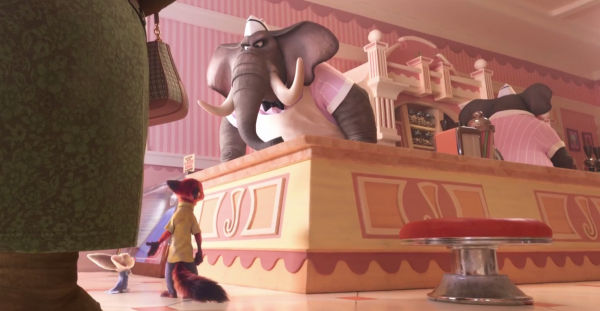
This was not Nick’s first encounter with discrimination. There are many indicators in Zootopia that would suggest that foxes in particular have a long history of discrimination. When Judy moves to Zootopia, her parents give her a can of fox repellent (which seems to be an animal version of pepper spray). At no point in the film is there an instance where “panther repellant” or “tiger repellant” are seen - only fox repellant. This may be a coincidence or this may have been done purposely for the plot. Regardless, this implies that foxes are the most dangerous of the predators. In the film, there are two instances where Judy considers using the fox repellent. The first is when she goes to approach Nick in Jumbeaux’s Café, where she displays her prejudice against foxes. The second occasion is when Judy is startled by Nick after a press conference. He lunges towards Judy as if he is going to bite her; this startles her and she instinctively reaches for her can of fox repellent. Judy tells Nick he’s “not that kind of predator” - which implies that it is typical for foxes to behave in an aggressive manner. Despite the fact that Nick and Judy have become close friends, she is able to immediately put their friendship to the side once there is even the slightest indication that he may be a threat to her.
Nick’s present day fight with discrimination has been an ongoing battle; he has faced with discrimination from a very young age.. In a flashback scene, Nick is seen excitedly getting ready for his first Junior Ranger Scouts meeting. This is group is one that has been typically reserved for prey - Nick is the only predator in the entire troop. He arrives at the meeting, thrilled to be a part of the group. At first, the other scouts seem to accept him into the group, until he goes to take his oath. He says in his oath, ‘I, Nicholas Wilde, promise to be brave, loyal, helpful, and trustworthy”. He is immediately met with contempt -- the other children agree that since Nick is a fox, he cannot embody any of those traits. Before he has any time to react, they place a muzzle over his face and one child says to him, “If you thought we would ever trust a fox without a muzzle, you’re even dumber than you look”. Despite that prey and predators have lived together peacefully for decades, even young children experience prejudice towards them. Much of the discrimination shown in Zootopia is targeted specifically towards foxes; it is uncertain if this is out of convenience (because Nick is a fox) or if foxes are considered to be more threatening than other predators.
Predators in Zootopia are alleged to have a longstanding history of behaving violently. At the beginning of the film, Judy is seen in a talent show alongside two other animals. During the play, the children discuss the history of the world, citing a time when it was “divided in two - vicious predator or meek prey”. She goes on to tell the audience that animals eventually evolved past their ‘savage ways’ and now are able to live together in harmony. This appears to be an allusion to segregation.
In the United States, there is a long history of separation of whites and minorities. The most prominent example of this is the Jim Crow segregation of blacks from whites, a practice which was finally outlawed in 1964 by the Civil Rights Act. One of the key reasons that segregation existed is the fear that the presence of African-Americans in predominantly white neighborhoods would lower property values.
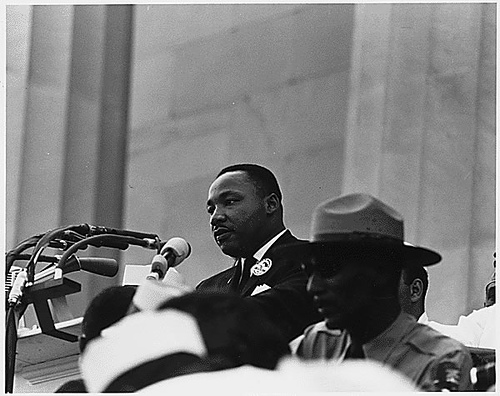
The reasoning for segregation within Zootopia seems a little different; it’s implied that the reason for predator and prey segregation is that predators were unable to control their animalistic urges in the same way as prey. Throughout the movie, various animals are seen “going savage” as a result of being shot with the “night howler” plant. At no point in time are prey seen going savage, although they are capable of doing so. When Judy returns home after resigning her position at the Zootopia Police Department (ZPD), she sees that her parents are growing night howlers, and her father is attempting to keep the children away from them. When Judy inquires about why he is so concerned about them, he tells her that her uncle ate one when he was a kid and went “absolutely nuts”. This is Judy’s first realization that both predator and prey can go savage, despite what she has been taught her entire life.
Besides racism, drug abuse and addiction is another theme seen in Zootopia. There is a common misconception that minorities, especially African-Americans, use drugs more than white Americans do. This misconception stems from the excessive amount of African-Americans who receive jail time for drug-related crimes. While they only make up approximately 12 percent of the U.S. population, 62 percent of prisoners serving time for drug-related offenses are African-American. Black men are thirteen times more likely to be sent to prison for drug-related offenses than White men. This unfortunate social issue is represented in Zootopia through the night howler plants. As previously mentioned, consumption of a night howler will cause an animal to turn ‘savage’, or to return to its primitive behaviors. Judy discovers that in the case of the fourteen predators that have gone missing throughout Zootopia, all of them have gone savage. For this reason, she assumes that predators are the only type of animal that can go savage. At the end of the movie, in a sudden turn of a events, Judy and Nick find out that Assistant Mayor Bellwether has been responsible for these incidents. She and other government officials have been shooting predators with the night howlers so that prey can maintain their dominance in Zootopia.
There is a belief that the War on Drugs was started to specifically target minorities. As discussed before, the incarceration rates for African-Americans are disproportionately high. In April 2016, one of Richard Nixon’s former advisors came forward and admitted that one of the purposes the War on Drugs was to criminalize black people. John Ehrlichman is quoted as saying, “We knew we couldn’t make it illegal to be either against the war or black, but by getting the public to associate the hippies with marijuana and blacks with heroin, and then criminalizing both heavily, we could disrupt those communities”.

Richard Nixon took office in 1969, five years after the Civil Rights Act was passed. Although segregation was officially over, racism was still running rampant. The Nixon Administration took this opportunity to ensure that whites would continue to have upper hand. In the same interview, Ehrlichman also said, “We could arrest their leaders, raid their homes, break up their meetings, and vilify them night after night on the evening news. Did we know we were lying about the drugs? Of course we did”. These mass incarceration rates are the result of lies and deceit, just as the outbreak of savage animals in Zootopia is due to government intervention. Just as the federal government sought to keep white people in a position of power, the government in Zootopia is seeking to keep prey in power. They both vilify the minority and contribute to institutionalized racism by means of manipulation.
Zootopia’s kid-friendly message on racial inequality has reached audiences globally. The film fared well even in countries such as Russia and China, where diversity and racism are not popular themes in media. Disney’s status as a multibillion dollar company has allowed Zootopia to climb charts globally and reach a large audience. They have taken advantage of the influential platform they have been given to send a message about racism around the world, reaching audiences of all ages. Hopefully, in the future, other companies will begin to follow in Disney’s footsteps to educate viewers on discrimination and the dangers it has on society.
Allyson Hazen is host to Squirrel Trivia with Sam and Allyson Wednesdays from 9p - 10p.
